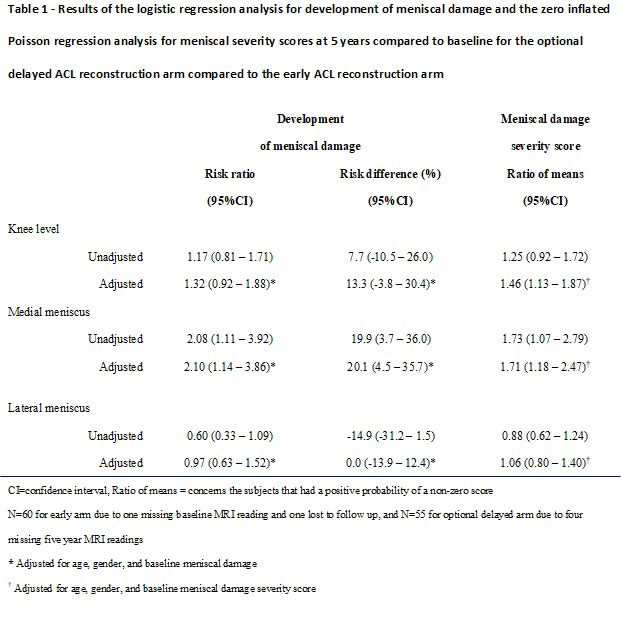Session Information
Date: Tuesday, November 12, 2019
Title: 5T098: Orthopedics, Low Back Pain & Rehabilitation (2798–2803)
Session Type: ACR/ARP Abstract Session
Session Time: 2:30PM-4:00PM
Background/Purpose: It has been suggested that recurrent instability episodes in a non-reconstructed anterior cruciate ligament (ACL) injured knee increase the risk for an incident meniscal tear. However, the evidence comes from observational studies with high risk on selection bias. Our objective was to determine development of meniscal damage over 5 years after ACL injury using data from the only randomized controlled trial in the field, comparing rehabilitation plus early ACL reconstruction (“early ACLR”) vs rehabilitation with optional delayed ACL reconstruction (“optional delayed ACLR”).
Methods: We used longitudinal knee MRIs including 121 young adults (ISRCTN 84752559; ethics approval LU 535-01). One musculoskeletal radiologist read baseline and 5-year follow-up images using the Anterior Cruciate Ligament Osteoarthritis Score (ACLOAS). We defined development of meniscal damage both dichotomously and as sum score representing severity (based on the sum of reclassified ACLOAS meniscus grades). Using a full analyzis set as randomized, we studied the development of meniscal damage (yes/no) with logistic regression, and severity with zero-inflated Poisson regression. Analyses were performed both on knee and on compartment level, and adjusted for age, sex, and baseline meniscal damage.
Results: In early ACLR, 60 of 62 participants remained (2 missing baseline MRIs). In optional delayed ACLR, 55 of 59 subjects had longitudinal MRIs. After 5 years we found a relative risk for development of meniscal damage on knee level of 1.3 (95% confidence interval [95%CI]=0.9-1.9) in optional delayed ACLR vs early ACLR (Table 1). For medial and lateral meniscal damage, respectively, the relative risks were 2.1 (95%CI=1.1-3.9) and 1.0 (95%CI=0.6-1.5). The mean severity score was 1.5 higher (more severe damage) on knee level in optional delayed ACLR vs early ACLR (95%CI=1.1-1.9) among those with meniscal damage at 5 years. For medial and lateral meniscal damage, respectively, the corresponding scores were 1.7 (95%CI=1.2-2.5) and 1.0 (95%CI=0.8-1.4) (Figure 1).
Conclusion: A strategy of early ACLR may reduce development of medial meniscal damage following ACL injury. For the lateral meniscus, ACLR seems neither to be protective nor to increase the risk of damage.
To cite this abstract in AMA style:
Snoeker B, Roemer F, Turkiewicz A, Lohmander S, Frobell R, Englund M. Does Early Anterior Cruciate Ligament Reconstruction Prevent Further Meniscal Damage? Secondary Analysis of a Randomized Controlled Trial [abstract]. Arthritis Rheumatol. 2019; 71 (suppl 10). https://acrabstracts.org/abstract/does-early-anterior-cruciate-ligament-reconstruction-prevent-further-meniscal-damage-secondary-analysis-of-a-randomized-controlled-trial/. Accessed .« Back to 2019 ACR/ARP Annual Meeting
ACR Meeting Abstracts - https://acrabstracts.org/abstract/does-early-anterior-cruciate-ligament-reconstruction-prevent-further-meniscal-damage-secondary-analysis-of-a-randomized-controlled-trial/


